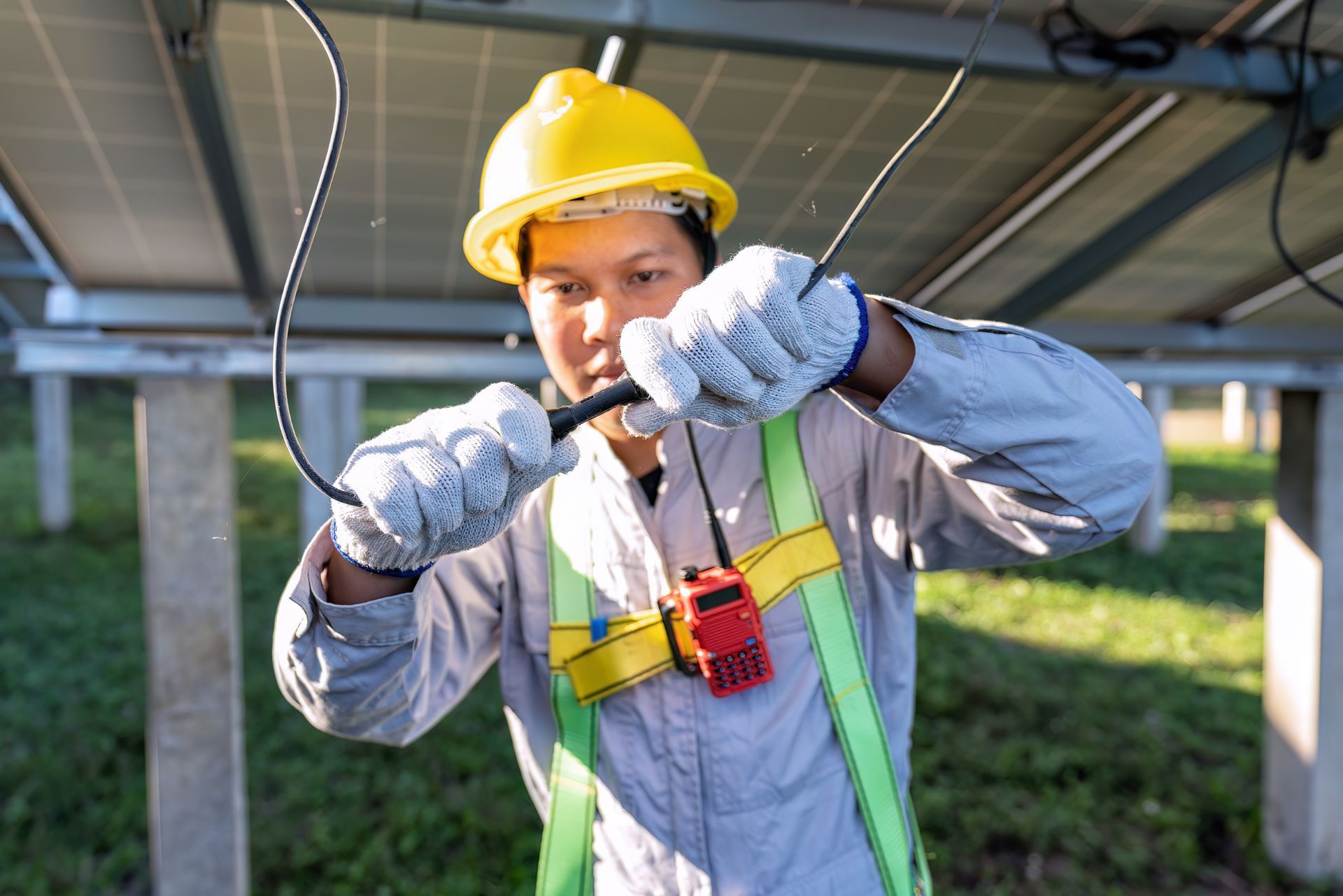Index
Contact Us
Phone
Location
Simi Valley, CA 93065
The Woodlands, TX 77382
Katy, TX 77494
In today's world, the demand for renewable energy sources has surged, with solar energy taking the lead. As more homeowners and businesses opt for solar panels, the role of solar panel electricians has become increasingly vital. However, with this growing demand comes the need for proper insurance coverage. Understanding
solar panel electrician insurance is essential for professionals in the field, as it protects them from various risks associated with their work. This article delves into everything you need to know about solar panel electrician insurance.
Understanding Solar Panel Electrician Insurance
Solar panel electrician insurance is a specialized form of coverage designed to protect electricians who install, maintain, and repair solar energy systems. This insurance is crucial for safeguarding both the electrician and their business from potential liabilities and losses. It typically encompasses various types of coverage tailored to the unique risks faced by solar panel electricians.
Types of Coverage
There are several types of coverage that solar panel electricians should consider when looking for insurance. These include:
- General Liability Insurance: This covers third-party bodily injury and property damage claims arising from your work. For instance, if a client is injured on the job site, this insurance can help cover medical expenses.
- Professional Liability Insurance: Also known as errors and omissions insurance, this protects electricians against claims of negligence or mistakes made during the installation or maintenance of solar panels.
- Workers’ Compensation Insurance: This is essential for electricians who have employees. It provides coverage for medical expenses and lost wages if an employee is injured on the job.
The Importance of Insurance for Solar Panel Electricians
Having the right insurance is not just a legal requirement in many places; it is also a critical aspect of running a successful business. For solar panel electricians, the risks associated with their work can be significant. From potential accidents on job sites to equipment failures, the financial implications of these risks can be devastating without proper insurance coverage.
Moreover, clients often seek out electricians who are insured, as it provides an added layer of trust and professionalism. Being insured can set a business apart in a competitive market, making it more appealing to potential customers. Additionally, many commercial contracts require proof of insurance before work can commence, further emphasizing its importance in securing jobs and building a reputable brand.
Furthermore, as the solar industry continues to grow, the complexity of installations is increasing. Electricians may find themselves working with advanced technologies, such as battery storage systems and smart grid integrations, which can introduce new risks. Insurance policies can often be tailored to address these evolving challenges, ensuring that electricians remain protected as they adapt to the changing landscape of renewable energy. This adaptability not only enhances the electrician's confidence in their work but also reassures clients that they are engaging with a knowledgeable professional who is prepared for the intricacies of modern solar installations.

Key Risks Faced by Solar Panel Electricians
Understanding the risks associated with solar panel installation and maintenance is crucial for electricians. By recognizing these risks, electricians can better appreciate the importance of having comprehensive insurance coverage. Solar panel electricians not only need to be skilled in their craft but also aware of the various hazards that can arise in this rapidly evolving industry. As renewable energy becomes increasingly popular, the demand for qualified electricians who can safely and effectively install and maintain solar systems is on the rise, making it essential to prioritize safety and risk management.
Physical Risks
Working with electricity and at heights presents inherent dangers. Electricians may face risks such as:
Electrical Shock: Handling live wires can lead to severe injuries or even fatalities. Proper training and the use of insulated tools are critical in mitigating this risk.
Falls: Installing solar panels often requires working on rooftops or ladders, increasing the risk of falls. Utilizing safety harnesses and following strict safety protocols can help prevent these accidents.
Equipment Injuries: Heavy machinery and tools can cause injuries if not handled correctly. Regular maintenance and proper training on equipment use are vital to ensure safety on the job.
Additionally, exposure to extreme weather conditions can pose further physical risks. Electricians often work outdoors, which means they must be prepared for heat exhaustion during hot summer months or frostbite in colder seasons. Understanding how to recognize symptoms of heat-related illnesses and having appropriate gear for cold weather can significantly reduce these risks.
Property Damage Risks
Accidental damage to a client's property can result in costly claims. For instance, if a solar panel installation leads to roof damage or if tools accidentally damage landscaping, the electrician could be held liable. This is where general liability insurance becomes essential. Furthermore, the risk of property damage extends beyond the immediate worksite. For example, if an electrician inadvertently damages a neighboring property while working, the repercussions can be significant, leading to disputes that may require legal intervention.
To mitigate these risks, electricians should conduct thorough site assessments before beginning any installation. This includes identifying potential hazards and ensuring that all necessary precautions are taken to protect the property. Clear communication with clients about the scope of work and potential risks can also help manage expectations and reduce the likelihood of disputes arising from property damage.
Legal Risks
Disputes can arise between electricians and clients over the quality of work or adherence to contracts. Professional liability insurance protects electricians from claims of negligence or failure to deliver services as promised. Legal risks can also stem from misunderstandings regarding warranties and guarantees on the solar panels and installation services. If a client believes that the system is not performing as expected, they may pursue legal action, which can be costly and time-consuming for the electrician.
Moreover, compliance with local regulations and building codes is another critical aspect of legal risk management. Electricians must stay informed about the latest laws and standards governing solar installations in their area. Failing to adhere to these regulations can result in fines, legal disputes, and damage to the electrician's professional reputation. Regular training and participation in industry workshops can help electricians stay updated on best practices and legal requirements, ultimately safeguarding their business and ensuring client satisfaction.
Choosing the Right Insurance Provider
ASelecting the right insurance provider is a crucial step for solar panel electricians. The right provider can offer tailored coverage that meets the specific needs of the business.
Researching Providers
Start by researching various insurance companies that specialize in coverage for contractors and electricians. Look for providers with a solid reputation and positive customer reviews. It's essential to choose a company that understands the unique risks associated with solar panel installation. Additionally, consider reaching out to industry associations or local trade groups, as they often have recommendations for reputable insurance providers who cater specifically to solar energy professionals.
Evaluating Coverage Options
Not all insurance policies are created equal. When evaluating options, consider the following:
- Coverage Limits: Ensure that the policy offers adequate coverage limits to protect against potential claims.
- Exclusions: Carefully read the policy to understand what is not covered. Some policies may have exclusions that could leave you vulnerable.
- Premium Costs: Compare premium costs across different providers, but remember that the cheapest option may not always provide the best coverage.
Moreover, it’s wise to inquire about additional endorsements or riders that can be added to your policy. These can enhance your coverage and address specific risks associated with solar panel installations, such as equipment breakdowns or environmental damage caused by installation activities. Understanding these nuances can significantly impact your overall protection and peace of mind.
Consulting with an Insurance Agent
Consulting with an insurance agent who specializes in contractor insurance can be beneficial. They can help assess your specific needs and guide you in selecting the right coverage. An experienced agent can also clarify any complex terms or conditions in the policy. Furthermore, a knowledgeable agent can provide insights into industry trends and emerging risks, ensuring that your coverage remains relevant as your business grows and evolves. They may also assist in navigating claims processes should the need arise, making the entire experience smoother and more manageable.

The Cost of Solar Panel Electrician Insurance
The cost of insurance for solar panel electricians can vary significantly based on several factors. Understanding these factors can help electricians budget for their insurance needs.
Factors Influencing Insurance Costs
Several factors can influence the cost of insurance premiums, including:
- Business Size: Larger businesses with more employees may face higher premiums due to increased liability risks.
- Location: Insurance costs can vary by region, with urban areas typically having higher rates due to increased risks.
- Claims History: A history of claims can lead to higher premiums, while a clean record may result in lower costs.
Average Premium Costs
While costs can vary widely, solar panel electricians can expect to pay anywhere from $500 to $2,000 annually for general liability insurance. Professional liability insurance may add an additional $300 to $1,500 to the annual cost, depending on coverage limits and the specific risks involved in the work.
Ways to Reduce Insurance Costs
There are several strategies that solar panel electricians can employ to reduce their insurance costs:
- Bundling Policies: Many insurance providers offer discounts for bundling multiple policies, such as general liability and workers’ compensation.
- Improving Safety Practices: Implementing safety training and protocols can reduce the likelihood of accidents, which may lead to lower premiums.
- Regularly Reviewing Policies: Periodically reviewing and updating insurance policies can ensure that coverage remains adequate and cost-effective.
Additional Considerations for Solar Panel Electricians
In addition to the aforementioned factors, solar panel electricians should also consider the specific nature of their projects when assessing insurance needs. For instance, working on residential installations may present different risks compared to commercial projects, necessitating tailored coverage options. Moreover, electricians should be aware of the evolving landscape of solar technology, as advancements may introduce new risks that could impact insurance costs. Staying informed about industry trends can help electricians anticipate changes in their insurance needs and adjust their policies accordingly.
The Importance of Comprehensive Coverage
Having comprehensive coverage is crucial for solar panel electricians, not just for compliance but also for peace of mind. This includes not only general and professional liability insurance but also coverage for equipment and tools, which can be expensive to replace. Additionally, electricians should consider coverage for business interruption, which can provide financial support in the event that unforeseen circumstances halt operations. By investing in a robust insurance portfolio, electricians can protect their livelihoods and ensure they are equipped to handle any challenges that may arise in their work.
Claims Process for Solar Panel Electricians
Understanding the claims process is vital for solar panel electricians. Knowing how to navigate this process can help ensure that claims are handled efficiently and effectively. With the increasing adoption of solar energy, it is crucial for electricians to be well-versed in the intricacies of insurance claims, as this knowledge can significantly impact their business operations and financial stability.
Steps to File a Claim
If an incident occurs that may lead to a claim, the following steps should be taken:
- Notify Your Insurance Provider: Contact your insurance company as soon as possible to report the incident.
- Document the Incident: Gather evidence, including photographs, witness statements, and any relevant documentation.
- Complete Required Forms: Fill out any necessary claim forms provided by your insurance company.
In addition to these steps, it is advisable to keep a detailed log of all communications with your insurance provider. This log should include dates, times, and the names of representatives you speak with. Such documentation can be invaluable if disputes arise later in the process, providing a clear record of your efforts to resolve the claim.
What to Expect During the Claims Process
Once a claim is filed, the insurance company will typically assign an adjuster to investigate the claim. The adjuster will assess the situation, review the documentation, and determine the validity of the claim. This process can take time, so patience is essential. During this period, it may be beneficial to follow up regularly with the adjuster to stay informed about the status of your claim and to provide any additional information they may request.
Moreover, understanding the specific criteria your insurance policy outlines for coverage can help streamline this process. Familiarizing yourself with the terms and conditions, including any exclusions or limitations, can prepare you for potential questions or challenges that may arise during the adjuster's review. This proactive approach can also help in setting realistic expectations regarding the outcome of your claim.
Common Challenges in the Claims Process
Solar panel electricians may face challenges during the claims process, such as disputes over coverage or delays in claim approval. To mitigate these issues, maintaining clear communication with the insurance provider and keeping thorough records of all interactions is essential. Additionally, being aware of common pitfalls, such as underreporting damages or failing to provide sufficient evidence, can prevent unnecessary complications.
Another challenge that electricians might encounter is the complexity of the claims related to specialized equipment, such as solar inverters and panels. These components often require specific knowledge and expertise to assess damages accurately. Therefore, it may be beneficial to have a trusted technician or an expert in solar technology assist in documenting the incident and providing detailed reports to support your claim. This can enhance the credibility of your submission and increase the likelihood of a favorable outcome.
Conclusion
Solar panel electrician insurance is a critical component of running a successful business in the renewable energy sector. With the right coverage, electricians can protect themselves from various risks, ensuring their business remains viable and secure. By understanding the types of coverage available, the risks involved, and how to navigate the insurance landscape, solar panel electricians can make informed decisions that safeguard their livelihoods.
As the demand for solar energy continues to grow, so too does the importance of having comprehensive insurance coverage. Investing in the right insurance not only protects electricians but also instills confidence in clients, ultimately contributing to the success and sustainability of the solar industry.
Types of Electrician Insurance We Provide
Areas we serve




